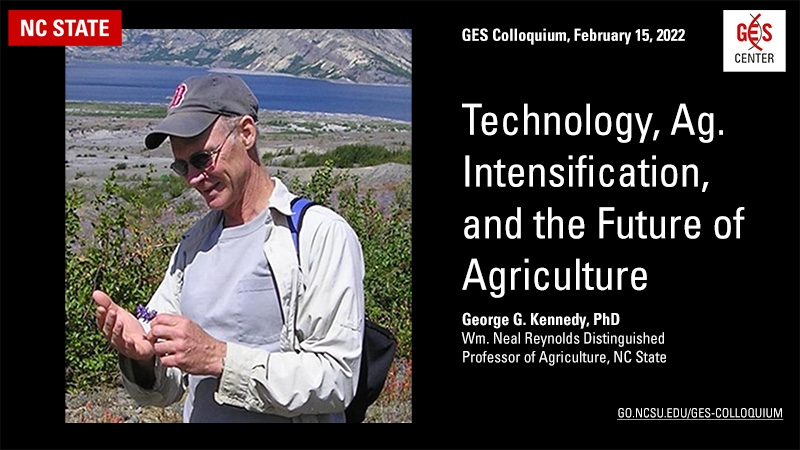
- This event has passed.
George Kennedy – Technology, Ag. Intensification, and the Future of Agriculture | GES Colloquium

Colloquium Home | Zoom Registration | GES Video Library (current) | Video Archives | Podcast | @GESCenterNCSU | Newsletter
Technology, Ag. Intensification, and the Future of Agriculture
George Kennedy, Wm. Neal Reynolds Distinguished Professor of Agriculture, Department of Entomology and Plant Pathology, NC State University
This presentation will explore the challenges to agricultural sustainability associated with technology driven agricultural intensification.
Abstract
Technological advances have driven agricultural productivity and defined agricultural production systems. Addressing the challenges to global agricultural in the coming decades relating to population growth and climate change, while minimizing negative environmental and health impacts and social disruption will necessitate major changes in agricultural production systems and agroecosystem structure. Sustainable production systems must rest on deep knowledge of crops and pest/disease biology and ecology. And they must be compatible with farmers’ objectives and those of the institutions that influence what farmers do. This presentation will explore these concepts and their implications relating to the intensification of agricultural production and the future of agriculture.
Speaker Bio
Dr. George G. Kennedy, a William Neal Reynolds Distinguished Professor of Agriculture at North Carolina State University, is known for his work on the ecology and management of insect pests of agricultural crops, insect-plant interactions, and the epidemiology and management of insect-vectored plant viruses. He holds B.S. and Ph.D. degrees in Entomology from Oregon State and Cornell Universities, respectively. He served as Department Head of Entomology at NCSU from 2009-2014 and has authored or co-authored over 240 research publications and has co-edited 5 books. His research focuses on fundamental processes acting on pest populations at multiple levels of biological organization, ranging from sub-organismal to landscape scale, and on improving the efficiency and sustainability of arthropod management in agricultural crops. Currently, he is working in collaboration with faculty in entomology, plant breeding, and plant pathology at NC State and other institutions to explore landscape-level processes that drive thrips population dynamics and pest status, and on the evolution and epidemiology of insect-vectored plant viruses, including research in Kenya and Tanzania on drivers of evolution in cassava mosaic begomoviruses. An important component of his research program involves the application of fundamental research to management of arthropod pests and sharing his findings with the agricultural community to facilitate the realization of new pest management practices. He is a Fellow, Honorary Member, and past Governing Board Member and President of the Entomological Society of America. He has received ESA’s Award for Excellence in Research and Founders Memorial Award and the Entomological Foundation Medal of Honor for contributions to entomology. He is also a recipient the North Carolina State University Borlaug Award for his contributions to agriculture.
GES Colloquium is jointly taught by Drs. Jen Baltzegar and Sumit Dhole, who you may contact with any class-specific questions. As conditions allow, colloquium will be held in-person in Poe 202, as well as live-streamed via Zoom (at least January will be 100% virtual). Please subscribe to the GES newsletter and Twitter for updates .
WordPress database error: [Unknown column 'wp_tec_occurrences.start_date' in 'SELECT']SELECT SQL_CALC_FOUND_ROWS wp_posts.*, CAST( wp_tec_occurrences.start_date AS DATETIME ) AS event_date
FROM wp_posts LEFT JOIN wp_term_relationships ON (wp_posts.ID = wp_term_relationships.object_id) LEFT JOIN wp_postmeta ON ( wp_posts.ID = wp_postmeta.post_id AND wp_postmeta.meta_key = '_EventHideFromUpcoming' ) LEFT JOIN wp_postmeta AS mt1 ON ( wp_posts.ID = mt1.post_id )
WHERE 1=1 AND wp_posts.ID NOT IN (16990) AND (
wp_term_relationships.term_taxonomy_id IN (149,521,802)
OR
wp_term_relationships.term_taxonomy_id IN (45,47)
) AND (
wp_postmeta.post_id IS NULL
AND
( mt1.meta_key = '_EventStartDate' AND CAST(mt1.meta_value AS DATETIME) >= '2026-02-25 10:46:59' )
) AND wp_posts.post_type IN ('post', 'page', 'attachment', 'tribe_venue', 'tribe_events', 'tribe_event_series') AND ((wp_posts.post_status = 'publish'))
GROUP BY wp_tec_occurrences.occurrence_id
ORDER BY event_date ASC, wp_posts.post_date ASC
LIMIT 0, 3